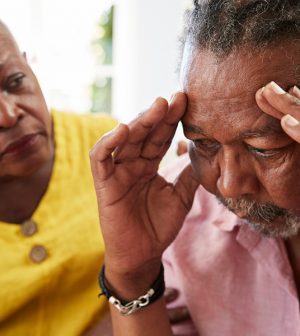- Could Your Grocery Store Meat Be Causing Recurring UTIs?
- Are You Making This Expensive Thermostat Error This Winter?
- Recognizing the Signs of Hypothyroidism
- 10 Strategies to Overcome Insomnia
- Could Artificial Sweeteners Be Aging the Brain Faster?
- Techniques for Soothing Your Nervous System
- Does the Water in Your House Smell Funny? Here’s Why
- Can a Daily Dose of Apple Cider Vinegar Actually Aid Weight Loss?
- 6 Health Beverages That Can Actually Spike Your Blood Sugar
- Treatment Options for Social Anxiety Disorder
6 in 10 Stroke Survivors Will Struggle With Depression Years Later

Six out of every 10 stroke survivors wind up struggling with depression later in their lives, a new study says.
That compares to the 22% depression rate of the general population, results show.
Further, 9 of 10 stroke-related depression cases occur within five years of surviving a stroke, researchers found.
“Depression is common in stroke survivors but our research shows it persists for much longer than previously thought,” researcher Yanzhong Wang, a professor of statistics in population health at King’s College London, said in a news release.
Biochemical changes in the brain caused by stroke injury can contribute to depression by interfering with a person’s ability to feel positive emotions, according to the American Stroke Association.
For the study, researchers reviewed the cases of 6,600 stroke survivors whose data appears in a South London stroke registry.
Results showed that severe depression tended to occur earlier after stroke, lasted longer than expected, and was quicker to recur than cases of mild depression.
Depression among stroke survivors can affect their mobility, hampering simple tasks like walking and holding objects, Wang said. It also can increase their overall risk of death.
“Quality of life is important for stroke survivors as there is evidence depressed survivors have a reduced survival rate,” researcher Lu Liu, a doctoral candidate at King’s College London, said in a news release.
“There are many reasons why this could be, including disruptions to the survivor’s social life, reduced physical ability and inflammatory disorders observed in depressed patients,” Liu added.
Doctors need to pay particular attention to stroke survivors who have depression that lasts longer than one year, “because of the high risks of experiencing persistent depression,” Liu said.
The new study appears in The Lancet Regional Health — Europe.
More information
The American Stroke Association has more about depression and stroke.
SOURCE: King’s College London, news release, March 25, 2024
Source: HealthDay
Copyright © 2026 HealthDay. All rights reserved.










